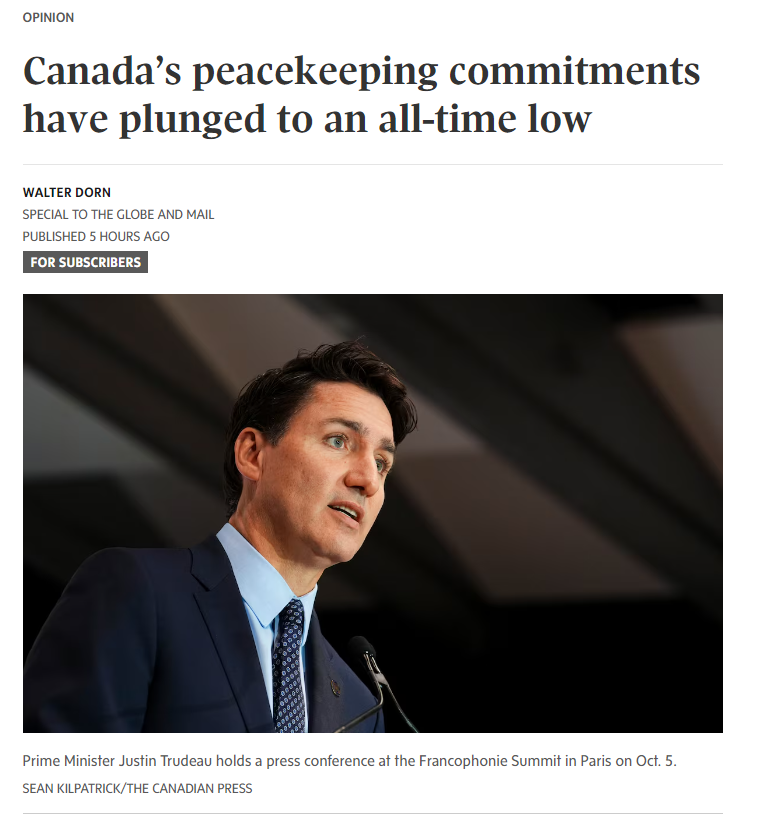Canada’s peacekeeping commitments have plunged to an all-time low
First published in The Globe & Mail, 8 October 2024.
Available at https://www.theglobeandmail.com/opinion/article-canadas-peacekeeping-commitments-have-plunged-to-an-all-time-low (pdf)

In 2015, Prime Minister Justin Trudeau declared that Canada was “back” on the international stage; not long after, his government promised to “renew Canada’s commitment to United Nations peace operations,” and pledged to send significantly more personnel. That’s important for UN peacekeeping, because it is only effective when countries from around the world contribute skilled military and police officers as part of broader political efforts to resolve the underlying causes of conflicts. And of course, many conflicts cry out for military observers and peace implementation forces around the world right now.
Yet our contribution of uniformed personnel to UN peacekeeping is currently at the lowest point since 1956, when Canada led the creation of the first peacekeeping force. According to the UN’s latest figures, Canada now provides only 26 personnel – just 17 military and nine police officers – out of the total of 62,000 uniformed peacekeepers. While Canada was once the world’s number-one contributor, it is now ranked 76th.
At a peacekeeping ministerial meeting in Vancouver in 2017, Mr. Trudeau pledged to provide a quick reaction force to the UN, but that promise remains unfulfilled, despite the desperate need. Even when the United States pushed Ottawa to pony up four years later, Canada did not even register the pledge in the UN’s readiness system. And last year, when Washington requested Canadian peacekeepers to combat gangs in Haiti committing mass violence in our own hemisphere, there was strong pushback from our military. (A new UN mission for that troubled island nation has been proposed by the US, but Canada has yet to announce a potential contribution.)
And while Canada’s main push in peacekeeping has been the promotion of women in such operations – in 2017, then-foreign minister Chrystia Freeland established the Elsie Initiative for that purpose – our contribution of female peacekeepers currently numbers only eight women, mostly police. The Canadian military deploys only two women, which fails to meet even the UN’s modest targets.
What can explain this failure?
This is a systemic problem that starts at the top, with a lack of political leadership. Despite the Liberals’ many pledges over the years, Mr. Trudeau has not made peacekeeping a priority. In fact, Stephen Harper’s government had a monthly average contribution of twice as many peacekeepers.
With much greater priority being given to NATO within the Department of National Defence, our commitment to the UN has been neglected. In the 1990s, Canada provided nine UN mission commanders, but none since. Little intellectual leadership has been shown in peacekeeping doctrine, planning or policy – areas in which Canada once excelled. Peacekeeping training in the Canadian Armed Forces has declined to a small fraction of what it was at the turn of the century.
There are a few bright spots, however. The Royal Canadian Air Force currently provides transportation assistance – a C-130 Hercules aircraft – for 15 days every three months in Africa, where the largest UN missions are located. A Canadian diplomat continues to chair the working group that prepares the annual report of the UN’s special committee on peacekeeping. Canada continues to push for the Vancouver Principles on peacekeeping and the prevention of child soldiers. The Elsie Initiative, after many stalled years, is helping other countries increase their female participation, even if it fails to do the same at home, and even though Canadians continue to make clear in public opinion polling that peacekeeping is their top priority for Canada’s military.
Canada’s diminished role has occurred as the UN has reduced its peacekeeping presence overall since 2016. The number of peacekeepers deployed in the field is almost half of what it was in 2016, when Donald Trump became U.S. president and pushed for a reduction in the peacekeeping presence and cost. But while there have been fewer opportunities for Canadians to serve in the field, Canada could still provide two to three times the number of peacekeeping personnel that it currently does.
Despite the failures of government, Canada has what it takes to be an excellent contributor to peacekeeping. Our multicultural population, lack of great-power aspirations, absence of historical colonial baggage in other countries, and past leadership in peacekeeping means that Canada remains viewed as a desirable peacekeeping contributor in many parts of the world. In addition, the men and women of Canada’s military and police forces have shown great ability in bringing peace to conflict-ridden zones.
A strong foundation exists. So there is still hope that Canada can once again become a prolific and dependable peacekeeping nation.
Walter Dorn is a professor of defence studies at the Royal Military College and the Canadian Forces College.
